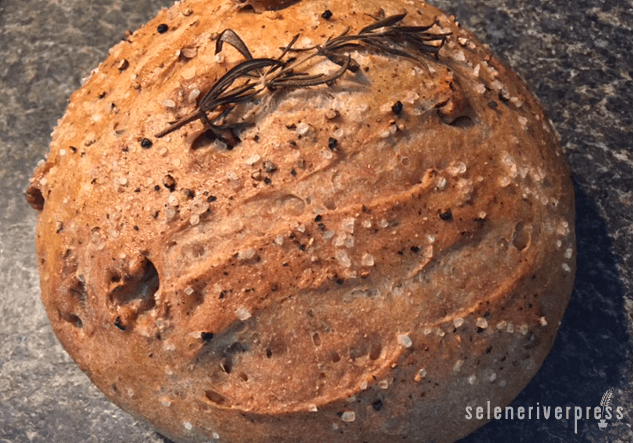Life can get crazy sometimes. Personally, I find the more daylight I have, the more I try to cram into it. Summers are filled with spontaneous trips to the lake, fingers deep in dark garden soil, and evening walks with my four-legged buddy. Seldom do I find time to prepare elaborate meals, usually opting for a quick grilled meat and salad or, almost as frequently, a casual, impromptu meal of cheese, charcuterie, antipasto, and bread.
This rosemary-walnut bread adds a bit of flair to my al fresco noshing. The traditional preparation—with a sourdough base and no yeast—creates a depth of taste that’s unparalleled in yeast-risen bread. The process of fermentation also provides nourishment and digestibility. You can make the dough on its own, without the addition of the herbs and nuts, but the combination of flavors in this recipe is so delicious I urge you to give it a try. This bread is equally appetizing beside a plate of cured meats as it is toasted and slathered with raw butter and honey.
Rosemary-Walnut Bread
Because bread dough is much more consistent when the ingredients are measured by weight, I’ve given both volume and metric weight measurements for this recipe. If you don’t have access to a scale, no worries—your bread will still turn out delicious! And for a refresher course in making your own sourdough starter, see my recipe for Whole Grain Sourdough Pancakes.
Prep time: 25 minutes, plus 24–36 hours inactive time
Cook time: 45 minutes
Yields 1 loaf
Ingredients
½ cup (120 grams) sourdough starter, refreshed for 2 or 3 feedings with equal parts water and flour
2 cups (506 grams) lukewarm water
4 teaspoons (15 grams) salt
4½ cups (580 grams) or more whole grain flour, freshly milled if possible
½ cup plus 2 tablespoons (70 grams) vital wheat gluten (optional)
1½ tablespoons chopped rosemary (fresh)
1 cup walnuts
1 egg, lightly beaten
Coarse salt
Cracked black pepper
Instructions
- Pull starter from fridge and feed about ¼ cup of it with equal parts water and flour. Let sit at room temperature until bubbly, about 6–8 hours. Feed again once or twice to fully refresh starter.
- In the bowl of a stand mixer or mixing bowl, measure out fully refreshed starter. Discard or use the rest in another recipe. Add water, salt, flour, and vital gluten, if using. Stir with a wooden spoon until fully combined. Cover loosely. Let rest for 20–30 minutes.
- Knead rested dough with a dough hook in stand mixer or by hand until smooth and elastic, about 5–7 minutes for stand mixer or 10–15 minutes by hand. Dough should be soft but not sticky. If necessary, add additional flour in small handfuls, incorporating well between each addition, until desired consistency is reached.
- Add rosemary, cracked black pepper, and walnuts. Knead until combined. Roll dough into a tight ball and place in an oiled bowl. Loosely cover with plastic wrap or a towel. Let sit in a warm environment for 1 hour. Punch down dough, then let sit for another 2–3 hours.
- Position rack in center of oven. Place a pizza stone and shallow pan filled halfway with hot water (I use a disposable aluminum pan) on the rack. Preheat oven to 425°F.
- Turn bread dough onto counter and roll into the loaf shape of your choice. Brush the top with beaten egg and sprinkle generously with coarse salt. Score the top of the loaf a few times with a sharp knife. Place dough on an inverted baking sheet lined with parchment paper. Cover loosely and let rest for about 35–45 minutes.
- Remove pizza stone from oven. Uncover bread and carefully slide on the parchment paper, then slide parchment paper onto the pizza stone. Return to oven. Bake for 20 minutes. For even baking, turn bread 180 degrees and bake another 20–30 minutes. Bread should sound hollow when tapped on the bottom.
- For best results, remove from parchment and cool on a rack for at least 1 hour before slicing.
AUTHOR’S NOTE
To choose your organically grown and fresh ingredients wisely, use the following criteria:
- chemical- and hormone-free meat
- wild-caught fish
- pasture-raised, organic eggs
- whole, unrefined grains
- virgin, unrefined, first-press organic oils
- whole-food, unrefined sweeteners
- pure, clean, spring water
- sea salt
- raw and/or cultured milk and cream products


